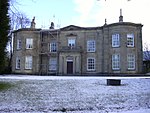Broadclough

Broadclough – historically Broad Clough (meaning "broad valley") – is a village located to the north of Bacup (where population details are included), previously having been a part of the old borough of Bacup and now with Rossendale borough of Lancashire and part of the Greenclough Ward. It is part of the Rossendale and Darwen constituency, with Jake Berry having been the Member of Parliament since 2010. Like much of Bacup, Broadclough is rapidly becoming a commuter area for cities and towns such as Manchester, Burnley, Accrington, Preston, Blackburn, Rochdale (and further afield). Broadclough is serviced by the mixed maintained Northern Primary School, which sits at the top of the ridge of the clough from which the village gets its name and Broadclough Lodge which is a special school. Children at Northern Primary School may take an 11 Plus exam to be considered for selection to Bacup and Rawtenstall Grammar School.
Excerpt from the Wikipedia article Broadclough (License: CC BY-SA 3.0, Authors, Images).Broadclough
Burnley Road, Borough of Rossendale
Geographical coordinates (GPS) Address Nearby Places Show on map
Geographical coordinates (GPS)
| Latitude | Longitude |
|---|---|
| N 53.712 ° | E -2.203 ° |
Address
Burnley Road
Burnley Road
OL13 8PQ Borough of Rossendale
England, United Kingdom
Open on Google Maps









